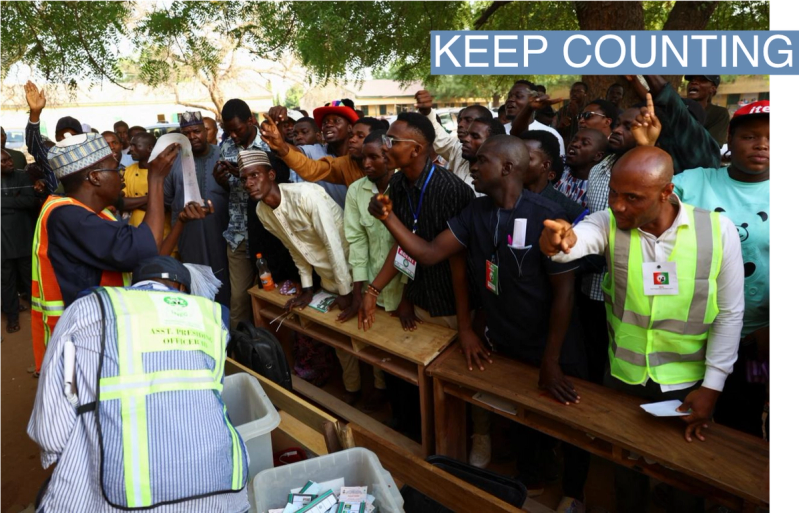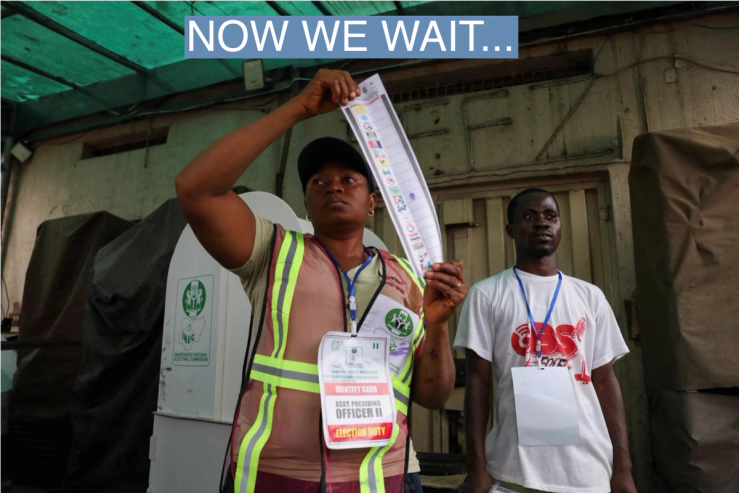The News
*This story is being updated as results come in
LAGOS — The first results from Nigeria’s general election have been announced after voting in some parts of Africa’s most populous nation was disrupted by malfunctioning biometric voting machines and incidents of violence.
In the most striking announcement so far, provisional results announced by state election officials show opposition candidate Peter Obi narrowly defeated the ruling party’s candidate Bola Tinubu in Lagos state. The southwestern state, which is Nigeria’s commercial hub, is traditionally the heartland of Tinubu’s political machine.
In another upset for the ruling party, the main opposition candidate, Atiku Abubakar, won the most votes in Katsina, the northern state that is home of the outgoing president Muhammadu Buhari.
Vote counting is ongoing in much of the country after Saturday’s presidential and national assembly elections. Results are being announced for local districts and then on a state-by-state basis by the Independent National Electoral Commission (INEC) from the federal capital in Abuja.
In the first result announced by INEC, Tinubu — presidential candidate of the ruling All Progressives Congress (APC) — was declared the winner in southwestern Ekiti state. It is one of the ruling party’s strongholds.
It was not clear how many of the 87 million people that collected their voting cards had been unable to cast their ballot. In some areas people were still voting on Sunday — a day late — due to technical glitches that meant machines did not accredit some people.
The race to succeed Buhari as president is widely considered to be the closest since the country returned to civilian rule in 1999. The country has been ruled by members of the two main parties — the APC and the People’s Democratic Party (PDP) — for the last 24 years.
There are three frontrunners among the 18 candidates. Tinubu, a former Lagos state governor, represents the ruling APC and Abubakar, a former vice president, is the candidate of the main opposition PDP. Obi, of the smaller Labour Party, has emerged as a third party candidate — the first time such a serious contender has emerged in Nigeria.
In this article:
KNOW MORE

The poll is the first to be carried out nationally using biometric machines known as the Bimodal Voter Accreditation System (BVAS), which uses facial and fingerprint recognition technology. They have been used to improve transparency. Results are then uploaded electronically with individual polling results displayed on the INEC website.
Electoral officials aimed to use the electronic system to make it harder to rig the elections and transmit the final results quicker than in previous elections. In the case of the last two elections, the final result was announced three days after the vote.
Voters in different parts of Nigeria complained that the machines malfunctioned, failing to recognize them. And the electoral body has not uploaded results as quickly as expected, prompting complaints from political parties.
The Situation Room, a coalition of Nigerian civil society groups, said its network of observers reported that the BVAS functioned “satisfactorily” in many polling units visited. “In 14 percent of the polling units, there were glitches including failure of the device to start, failure to authenticate voters, discharge of battery and intermittent power malfunctioning,” it said.
Meanwhile, uncorroborated figures have circulated on social media.
“I appeal to all political parties and media organizations to draw their figures only from the official results released by the commission as the only body constitutionally responsible for releasing official election figures,” INEC chairman Mahmood Yakubu said at a media briefing in Abuja on Sunday.
Speaking to Semafor on Monday, Afolabi Adekaiyaoja, lead researcher at the Centre for Democracy and Development think tank in Abuja, said: “The heightened political environment means parties may weaponize situations that are not favorable to them to whip up sentiments with supporters.”
QUOTEWORTHY
“The election fell well short of Nigerian citizens’ reasonable expectations,” said election observers the International Republican Institute together with the National Democratic Institute. “Logistical challenges and multiple incidents of political violence overshadowed the electoral process and impeded a substantial number of voters from participating.”
In a preliminary joint statement their election observation mission added that the late opening of polling stations “created tensions” and “the secrecy of the ballot was compromised in some polling units given overcrowding.”
Voters’ trust was also “eroded” by challenges with the electronic transfer of results and their timely upload to a public portal, they said, as well as the manner in which the problems were communicated by the INEC.
Notable
- The BVAS and the INEC Election Result Viewing Portal (IReV) were both designed to enhance the transparency of election results and boost public trust in elections, explains the International Institute for Democracy and Electoral Assistance. INEC wants to tackle several long-time weaknesses in previous Nigerian elections including falsification of votes at polling units and of the number of accredited voters, collation of false results, and making declarations while result collation is still in progress.

